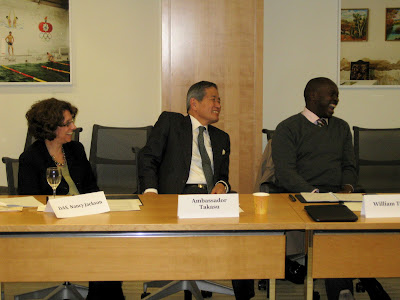Development Effectiveness in Conflict-Affected Countries –
A Look at the New Deal and the Future of the Millennium Development Goals
Last year in Busan, Republic of Korea, 35 major donor and host country governments, including the United States, endorsed the New Deal for Engagement in Fragile States
in order to make development aid more effective in “Conflict-Affected and
Fragile States” (CAFS). It elevates local priorities in international
aid systems and calls for more inclusive relations between country
governments and civil society so local people can chart their own course
out of violence and poverty. It also adds an important conflict lens to
the future framework that will eventually replace the Millennium
Development Goals (MDGs) after 2015, as most “fragile states” have yet to reach
a single MDG.
The New Deal calls upon donor and host nations to change the way they manage bilateral and multi-lateral aid and development strategies in a way that builds greater mutual trust, allows genuine country ownership and leadership,
and is built on "legitimate" inclusive politics and government-civil society relations in the host
country that emphasizes the security of citizens and access to justice
so societies can chart their own path out of conflict and fragility.
Such principles are not new. What is new about the New Deal is the level of political will behind the calls for reform that give these ideals much more traction than in in the past. They have already resulted in tangible changes underway in donor and host country aid systems. Another novel development is the degree of collaboration and coordination among g7+ (fragile state) governments, who have joined together as a major collective force to make the New Deal a reality.
More than 70 Alliance for Peacebuilding (AfP) members participated in this panel discussion as part of AfP's Annual Conference.
Neil Levine, the Director of USAID's Office of Conflict Management and Mitigation and one of the leaders of U.S. efforts to implement New Deal principles, spoke about concrete changes the United States has made since Busan, including the April 21st announcement of a strategic partnership with Liberia and Sweden as a pilot project to implement New Deal principles. Dayna Brown, the Director of the Listening Project at CDA Collaborative Learning Projects, discussed the significance of the New Deal from a civil society point of view, noting important changes the peacebuilding and development communities have been advocating for for a long time. Finally, Andrew Tomlinson, the Director and Representative at the Quaker United Nations Office of New York placed the New Deal in the context of international conventions on development and the post-2015 framework that will come after the Millennium Development Goals, and pointed to key concerns that will need to be addressed by the international community if the New Deal is to play a truly pivotal role in the long-term. 3P's Program Manager John Filson Moderated the discussion.
 |
| Peacebuilding practitioners and scholars, members of the Alliance for Peacebuilding (AfP) at the 2012 AfP Annual Conference May 10 - 12 in Washington, DC |
 |
| Neil Levine, Director of the Office of Conflict Management and Mitigation at USAID |







